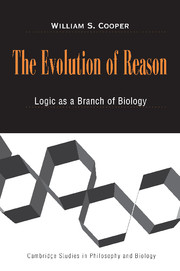Book contents
- Frontmatter
- Contents
- Foreword
- 1 The Biology of Logic
- 2 The Evolutionary Derivation of Life-History Strategy Theory
- 3 The Evolutionary Derivation of Decision Logic
- 4 The Evolutionary Derivation of Inductive Logic (Part I)
- 5 The Evolutionary Derivation of Deductive Logic
- 6 The Evolutionary Derivation of Inductive Logic (Part II)
- 7 The Evolutionary Derivation of Mathematics
- 8 Broadening the Evolutionary Foundation of Classical Logic
- 9 The Evolutionary Derivation of Nonclassical Logics
- 10 Radical Reductionism in Logic
- 11 Toward a Unified Science of Reason
- Appendix: Formal Theory
- References
- Index
6 - The Evolutionary Derivation of Inductive Logic (Part II)
Published online by Cambridge University Press: 18 December 2009
- Frontmatter
- Contents
- Foreword
- 1 The Biology of Logic
- 2 The Evolutionary Derivation of Life-History Strategy Theory
- 3 The Evolutionary Derivation of Decision Logic
- 4 The Evolutionary Derivation of Inductive Logic (Part I)
- 5 The Evolutionary Derivation of Deductive Logic
- 6 The Evolutionary Derivation of Inductive Logic (Part II)
- 7 The Evolutionary Derivation of Mathematics
- 8 Broadening the Evolutionary Foundation of Classical Logic
- 9 The Evolutionary Derivation of Nonclassical Logics
- 10 Radical Reductionism in Logic
- 11 Toward a Unified Science of Reason
- Appendix: Formal Theory
- References
- Index
Summary
In Chapter 4 an evolutionary theory of probability was outlined as a basis for inductive logic. Probability theory itself counts as a system of ‘induction’ under at least some definitions of that overworked term. Other authorities have characterized induction in other ways. While it would not be practical to address all systems of induction ever proposed, in this chapter a few additional sorts of inductive reasoning will be explored. They are extensions of probability theory in significant directions that have been or could be regarded as inductive. By looking at such special kinds of induction it is possible to gain further insight into the evolutionary reducibility of inductive logic in general.
These facets of induction have been put off until now because they presuppose a certain amount of deductive theory. In terms of the ladder metaphor, it would be appropriate to imagine that a portion of the inductive logic rung has been separated off, moved up, and reaffixed as a separate rung just above the rung for the pragmatic level of deductive logic.
THE PROBABILITY CONDITIONAL
When deductive logic is built up from a platform of probabilistic pragmatics, it becomes possible to introduce sentence connectives other than the usual classical ones. An especially interesting device in this class is the conditional probability connective, or probability conditional. It has been studied long and fruitfully by Ernest Adams (e.g., 1965; 1975; 1998) and in his honor it is sometimes called the Adams conditional (Eells and Skyrms 1994; Skyrms 1984).
The probability conditional is defined by extending the definition of degree of belief.
- Type
- Chapter
- Information
- The Evolution of ReasonLogic as a Branch of Biology, pp. 109 - 124Publisher: Cambridge University PressPrint publication year: 2001

